Heidegger, Kant, and the Political
It is especially significant that Heidegger’s attention to the early modern during Weimar Germany’s liberal democratic crisis lands his larger project in the ancient world. He famously developed his emphasis on ontology from his early work on Duns Scotus, where he found that for people writing before the Renaissance, there was an inversion of meaning between subject and object with reference to translations of ‘essence’ and ‘ousia.’[1]
It was the opposite of the moderns’ characterization of a duality between subject and object because it rejected Aquinas’s interpretation of Aristotle’s concerns with happiness and flourishing. The rejection of an emerging rights-based account of the individual will as mechanistically aligned with happiness was something that Duns Scotus (and Heidegger following him) rejected. Affectio commodi (affection for advantage or self-intereset) had to be preceded by a more libertarian view of affectio iudicae or an “appetite” or “affection” toward justice.
A freedom to choose wrongly, to will badly, is necessitated by a concept of justice unbound to the intellect. For Scotus, this preserved an acknowledgment of divine power that exceeded creatures’ wills. The will could not be alone in its future intentionality toward the world, and this pushed Heidegger away from the kind of subject-object orientations that Cartesian and Kantian philosophy relied on. Heidegger’s return to Aristotle was a return to ontology that famously turned the discipline of philosophy upside down, making philosophy “the history of philosophy;” but this move was itself rooted in Heidegger’s historical situation and critiques of liberalism.
In the broader philosophical discourse of the period, this was an over-turning of Kantian modernism, which accepted, even in Protestant terms, an optimistic account of rationality as moving toward completion. The modern conception evidenced a process of internalization of the world by humans, the well-known development of modern subjectivity whereby perception becomes a ‘prison-house.’[2] This perception is itself built from humanism and then radicalized by versions of liberalism during the Enlightenment that saw the individual as autonomous, separate from nature, yet subject to the emergent State.
While Heidegger challenged such subjectivity with his ontological turn, he also emphasized in the conception of being-toward-death the individual’s “ownmost” possession. In other words, like Badiou, he did not give up the individual even if he rejected the Kantian subject. Liberals in the United States often miss this critical move made by continental philosophers, which is why I am emphasizing the point with this array of thinkers.
Heidegger’s modernism is embedded in the ontological articulation of being and existence of humans rather than any argument concerning the a priori existence of another, more transcendent being or “natural” law, because any such understanding of an a priori category would necessarily come after-the-fact of a being articulating itself from the position of its being “thrown” into the world. Heidegger’s focus on existentialism led to a phenomenological description of being in the world that would take precedence for him over metaphysics.
That is one reason why dealing with Heidegger’s own theology is difficult, even if he claimed to have never left the church later on in his life. But his focus on the individual grasping an authentic existence also alluded to mythological protagonists and heroes (and gods) who could kill with their own hands.[3] Nor do later thinkers of the event and militancy like Badiou and Raschke entirely escape a longing for existentialist authentes.
Even so, they are offering traditional liberals something new in doing so; and yes, the critique is also embedded in a communist-leaning French critique of Gaullism, a historical exigence often missed by American academic exuberance for poststrucuralism without political attachment. The historical exigence that Badiou and Raschke point to is not the same exigence as Heidegger or other 20th century critics of liberalism, but a critique of liberalism is at work in the concept of militancy.
In contrast, traditional liberalism and natural right subjectivity de-emphasizes militancy. For example, Immanuel Kant’s taxonomy for philosophy was anything but “authentic” because it described morals as a branch of ethics, which dealt with freedom as separated from nature (physics). It presented a study of freedom (ethics) as separate from being in the world (Heidegger’s Dasein). In “Idea for a Universal History with a Cosmopolitan Purpose,” Kant’s thesis is based on the premise that “no law-governed history of mankind is possible” because humans are driven by neither instinct nor rational thought alone.
When we look at human actions on a global level they appear childish, 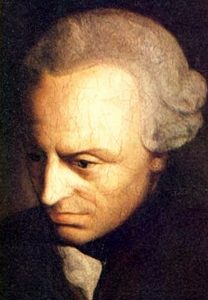 destructive, and full of folly. Therefore, for Kant, the philosopher’s only recourse can be “to attempt to discover a purpose in nature behind this senseless course of human events, and decide whether it is after all possible to formulate in terms of a definite plan of nature a history of creatures who act without a plan of their own.”[4] Creatures are endowed with natural capacities suited to an end, which unfolds in their lives. But they seem to be able to catch a glimpse of the “Creator’s” design in Kant.
destructive, and full of folly. Therefore, for Kant, the philosopher’s only recourse can be “to attempt to discover a purpose in nature behind this senseless course of human events, and decide whether it is after all possible to formulate in terms of a definite plan of nature a history of creatures who act without a plan of their own.”[4] Creatures are endowed with natural capacities suited to an end, which unfolds in their lives. But they seem to be able to catch a glimpse of the “Creator’s” design in Kant.
In Kant, humans are distinct as rational animals endowed with reason. Kant defines reason as, “a faculty which enables the creature to extend far beyond the limits of natural instinct the rules and intentions it follows in using its various powers, and the range of projects is unbounded.”[5] One almost wants to throw in the word imagination, precisely the analysis Thomas Hobbes gives in the opening of Leviathan as he develops humans’ emergence from a state of nature.
For Kant, we can imagine things greater than ourselves outside of ourselves. Because we are limited as individuals, “it will require a long, perhaps incalculable series of generations, each passing on its enlightenment to the next, before the germs implanted by nature in our species can be developed to that degree corresponds to nature’s original intention.”[6] Kant says, “Nature gave man reason, and freedom of will based upon reason, and this in itself was a clear indication of nature’s intention as regards his endowments.” But curiously this keeps imagination individuated, especially when we consider his next move.
For Kant, humans are “mortal as individuals but immortal as a species,” and nevertheless they are “still meant to develop [the species’] capacities completely.”[7] We see the rumblings of utilitarianism here. So, according to Kant, humans develop culture gradually, and their originally pathological need to seek power and prestige within a group, to thrive on an inherent anti-social misanthropy, leads them away from nature.
Envy, strife, and incompatibility foster a need for development. Taste is borne of the fruits of and inherent unsociability that initiates a conflict that gives force to the perpetuation of the species toward its end. Liberalism deprived of a cultural force, as current liberal crises in the United States and United Kingdom show, is not only devastating from a Kantian perspective but misses the point of civilization.
As Kant knows, however, achieving a peaceful civil society is the greatest challenge for humans collectively. States are formed but they will remain in perpetual warfare “and necessarily undergo further revolutions of a similar sort, till finally, partly by an optimal internal arrangement of the civil constitution, and partly by common agreement and legislation, a state of affairs is created which, like a civil commonwealth, can maintain itself automatically.”[8]
According to Kant, Rousseau’s inclination to a state of nature ought not be sought in the pre-political, but in the post-revolutionary realm of perpetual peace.[9] States ought to abandon “violent needs” for expansion in order to bring about encourage the “hope that, after many revolutions, with all their transforming effects, the highest purpose of nature, a universal cosmopolitan existence, will at least be realised as the matrix within which all the original capacities of the human race may develop.”
Because of this, philosophy ought to think itself capable of “furthering the purpose of nature itself.” This will depend on an educated public. Even so, a cosmopolitan existence will be centuries in the making, and Kant ends with a qualifier saying that this is / ought to be the task of philosophers working with knowledge of history – that it is a possibility that they might attempt, but that they will not “supersede the task of history proper, that of empirical composition.”[10] Therefore, for Kant, we ought to concern ourselves with the burdens we are bequeathing to future generations.
But there is both hubris and humility here. Kant’s hubris is in his optimism that humans can “further the purpose of nature itself.” His humility is in refusing to grant the completion of this task to philosophers. Moving on, Kant says, “the basis of obligation must not be sought in the nature of man, or in the circumstances of the world in which he is placed, but a priori simply in the conception of pure reason.”[11] Pure reason, for Kant, exceeds the individual and binds him or her in subjective position. Empirical circumstance can align with the universality of pure reason as practical rules, but practical rules are not to be confused with moral law.
Because Kant’s political theory, no matter how pragmatic or deliberative it seeks to be, is ultimately wrapped up in what is now called deontological (duty-bound) ethics, Kant’s political theology must be sought in a subordination of the individual to a process of historical development that produces an apparatus of human culture. To the extent that Kant refers to the “natural” inclinations of humans, they are produced by a capacity for reason that must transcend nature. In his “Introduction to The Metaphysics of Morals,” Kant is also humble enough to say we cannot go beyond the Greeks, but modern philosophy seemed to have forgotten that, which prompted Heidegger’s return to ontology.
While Kantian scholars may disagree with one another about whether or not this transcendent view of reason is really pseudo-Christian in its providential view of the unfolding of history, what is clear in Heidegger’s influential break from the Kantian tradition is a return to something more like paganism – an important counterpoint to conceptions of “political theology” that reside in the “kingdom” Christians come to understand as βασίλειο, which is an altogether contrasting notion to the Greek πολιτική.
According to Heidegger’s quotation above, the “Good” (ἀγαθός) is already implied in Aristotle’s notion of politics, from which ethics cannot be distinguished because “being of the human genuineness” precedes it, and here is perhaps an early version of the authentic angst that will emerge more fully in Being and Time. This conception of the good is spatial in the sense of “in the direction of [cultivating knowing-the-way-around the being of human beings in its genuineness]” and would be opposed to the more visual καλός as an evidencing of internal good by its presentation in external form.
We might say that ἀγαθός, precedes καλός in the way that Scotus necessitates the libertarian conception of freedom untethered to the temporal unfolding necessitated by the scholastics’ optimism for a notion of human will patented as the instantiation of the divine, whether it be divine will or autonomous reason. Similarly, we might say that Heidegger’s reading of Aristotle as an extension of his studies on Scotus and Augustine land in a pre-Christian notion of “will” that attends more to space than to time.[12]
This “will” ought not be confused with Nietzsche’s will-to-power (which will be important in Raschke’s work). It ought also not be confused with a utilitarian favoring of the species over the individual. Perhaps this hazy space between the individual and the species, which Heidegger’s existentialism sought to emphasize without a Cartesian reliance on Husserl[13] yet relying on a debt to Husserl which Levinas has indicated, needs to be examined more subtly than a brute heroism in the likes of Achilles’ humbling himself to return Hector’s body, or even Odysseus’s argument against Ajax in Ovid’s Metamorphoses concerning his right to Achilles’ armor.
What I am getting at is that ancient, Irenic culture admitted to its limitation both in brute force as well as in intellect. Its civilizing potential is in its limiting capability, something entirely absent in neo-liberalism’s consuming and iterative deployment of weak subjectivities. Heidegger’s philosophy also misunderstands this emphasis on limits in the ancients even while he extracts an ancient tension between poiesis and techne in his post WWII writing and the German concern with Instrumental Reason.
Heidegger’s concern in the post WWII era is in some ways little different than Max Weber’s concern with instrumentality at the end of The Protestant Ethic and the Spirit of Capitalism. In both thinkers, technology exceeds the individual’s capacity for knowledge and so the individual is forced to work within the pre-fabricated structures of knowledge, which, though humanly constructed, nullify the individual’s existence through an epistemology of ‘the They’ (Das Man).
Misinterpretations of Heidegger often come from a misapplication of Heidegger’s defense of the individual in which that individual is confused with a mythological hero who displays Nietzsche’s will-to-power as if that consciousness could be embodied in a twentieth-century subject. Liberal Anglo thinkers such as Reinhold Niebuhr confuse a will-to-power with the power of will. Self-righteous liberals often condemn German thinkers for articulating anything beyond the “will” as inherently anti-individual, anti-liberal, and inherently fascist.
This is a mistaken reading. Heidegger understood the need for the social within the political; he chose a corrupted version of it in the form of a grasping mythological politics of decision to create a perpetual state of exception.[14] Neo-liberals have not understood that unfettered capitalism leads to the same situation. Regulatory liberals have not understood the force of what they are dealing with because it is an ancient force that precedes the fiction of the State.
Much has been said, both in scholarly and popular representations, concerning the political space of fascism in relation to mythology, mysticism, and (oc)cultism – so much so that even in the mythos of a popular film Raiders of the Lost Ark, Indiana Jones needs to safely bring the ark of the covenant home to the exceptional State of the New Jerusalem. But more serious attention needs to be given to the theological space of paganism and sacrifice in the discourse of political theology, a discourse teeming with sentimental representations of Christianity and misunderstandings of what Western scholars mean by the “postsecular” situation.
Both Kahn and Raschke help to understand the role of force in current liberal crises because they do not fall into the trappings of liberal critics too far removed from continental and classical thought. Kahn and Raschke will also balance one another in this regard. I turn here to Kahn.
Kahn’s Liberal Secularism
In The Future of Illusion, Kahn’s analysis of Ernst Kantorowicz’s The King’s Two Bodies as an intended extension of Ernst Cassirer’s The Myth of the State includes in brief the fact that Cassirer meant his book as an attack on Heidegger as well as National Socialism with respect to the dangers of conceiving politics as myth. Even so, recent thinkers like Paul Kahn (no relation to Kahn) have continued to stress the necessity of conceiving the political in terms of sacrifice and sacred founding.
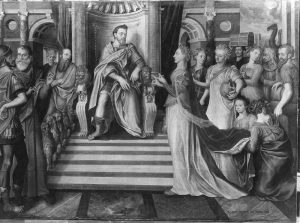 In Kahn’s reading of Cassirer, the danger of mythologizing politics masks the very fictive and poetic nature of both law and literature. Her reading of Kantorowicz suggests that The King’s Two Bodies, especially when read alongside post-WWII defenses of secularism like Erich Auerbach’s Mimesis, “uses the resources of the legal and literary traditions to reimagine the relationship between politics and theology and the idea of the secular state. And [Kantorowicz] does so in a way that differs from the narratives of Schmitt and Cassirer.”[15] The unifying text for both Kantorowicz and Auerbach is Dante’s Commedia, where Virgil crowns Dante and “(like Richard II) stands for literature or fiction that knows itself” as myth.
In Kahn’s reading of Cassirer, the danger of mythologizing politics masks the very fictive and poetic nature of both law and literature. Her reading of Kantorowicz suggests that The King’s Two Bodies, especially when read alongside post-WWII defenses of secularism like Erich Auerbach’s Mimesis, “uses the resources of the legal and literary traditions to reimagine the relationship between politics and theology and the idea of the secular state. And [Kantorowicz] does so in a way that differs from the narratives of Schmitt and Cassirer.”[15] The unifying text for both Kantorowicz and Auerbach is Dante’s Commedia, where Virgil crowns Dante and “(like Richard II) stands for literature or fiction that knows itself” as myth.
But if the conclusion of The King’s Two Bodies is about the role of art in bringing about a new, secular cosmopolitanism, such secular cosmopolitanism is not the teleological result of reason in history. To the contrary, it is always vulnerable to the upsurge of the irrational forces of myth.[16]
Such a statement concerning art that “knows itself” to be fiction allows Kahn to re-contextualize Claude Lefort’s claims in “The Permanence of the Theological-Political” regarding democracy’s ability to “have represented power in such a way as to show that power is an empty place and to have maintained a gap between the symbolic and the real.”[17] Such a poetic presentation of democracy is exactly what Schmitt’s nostalgia for a monarchical, Catholic personal decider who is able to commune with the divine in the miraculous state of exception lacks. In contrast, Kahn’s reading presents readings more in line with Walter Benjamin’s characterizations of early modern texts (Hamlet and Richard II in particular) not as Schmittian instances of tragedy but as ur-texts for the more relativistic Trauerspiel.
As Kahn claims, “Although Lefort goes on to claim that ‘any society which forgets its religious basis is laboring under the illusion of pure self-immanence and thus obliterates the locus of philosophy,’ this ‘religious basis’ proves to be a metaphor between the symbolic and the real.”[18] Democracy’s poetic advantage over fascism is in the lack of “one particular body or one particular place.”[19]
Kahn’s main argumentative thrust, however, relies on various twentieth-century interpretations of Machiavelli. Kahn argues that “Machiavelli’s view of religion elaborates a political theology in the specific sense that it makes religion a contested political instrument: theology in this sense is relevant only to the extent that it is politically useful or has political consequences.”[20] It is in this instrumental sense of religion that she suggests Machiavelli’s thought ought to be recovered in the 21st century, largely because he offers a political theology that “is always at the same time poetic theology.”[21]
Against Schmitt’s reading of Machiavelli as anti-liberal in his characterization of the necessary evil of human nature, Kahn aligns with Leo Strauss’s reading of Machiavelli as proto-liberal because “human nature was already complicit with liberalism, because it elaborated an anthropology based on the lowest common denominator.”[22] While both Schmitt and Strauss are critics of liberalism, in Kahn’s reading of Machiavelli as proto-liberal she suggests, citing Friedrich Meinecke:
While recognizing certain constant features or tendencies of human nature, Machiavelli held that human nature is malleable. Thus, instead of focusing on a timeless model of the ideal state, Machiavelli recommended “a form of reconnoitering and judgment, which was already closely related to modern historical judgment.”[23]
For Kahn, the malleable qualities of human nature call for vigilant attention to historical context for producing deliberative judgment. It is not, however, completely relative historicism. Kahn points out Machiavelli’s reliance on the Roman poet Lucretius (99-55 BCE) and his work De rerum natura:
What [Machiavelli and Lucretius] shared was a naturalistic account of human nature, including human passions and desires; an emphasis on the importance of chance and free will for the purposes of description and/or enlightenment. Chief among these was religion.[24]
Although his work had been banned, Kahn notes that Machiavelli had himself transcribed Lucretius and that under censorship the number of copies of the text increased “fiftyfold” during the 15th century, much to the dismay of enthusiastic anti-pagans such as Savonarola. Machiavelli turned to ancient Rome in his Discourses on Livy to assert the poetic foundations of myth and the state, particularly the case of Numa, who “feigned conversation with a nymph in order to convince the Romans that his ‘new and unwonted laws’ were divinely inspired.”[25]
While Kahn’s work focuses on Machiavelli’s attention to Livy’s account of poetics, I should also point out the Livy’s contemporary, Ovid, in his Metamorphoses displays a virtuosic account of poetic accounts of changes, and that in the penultimate account (before the apotheosis of Augustus), Numa visits Pythagoras, who tries to compel Numa concerning the uselessness of sacrifice.
Among the many metamorphoses is a repeated motif of “twice born” or resurrected gods (especially Dionysus and Hercules). Both Livy and Ovid were Romans living during the period when Jesus Christ is said to have been born amid an emerging controversy among Jews as to the idea of an afterlife, which appears to be at least partially the result of a blending of Greek philosophy, especially with regard to Plato’s reliance on myth in the Republic.
A long history of anti-pagan Christian writers have rejected the notion that features of the religion are pagan, and only during the past century have there been serious contextual studies of early Christianity as primarily Jewish, largely fueled by reparative work and, thankfully, Nazi Germany’s inability to “solve” what was known as “The Jewish Question.”
Still today, however, when political theology is discussed in the West, the framework is almost always more “Christian” than even a Judeo-Christian one, and the motivation for both believers and non-believers occurs in a monotheistic context unaware of or unwilling to acknowledge its internal multidimensionality.
For a large majority of people, believers or non-believers, this context is so thoroughly historically uninformed that even “experts” in the field of religious studies do not agree on what is meant by the “religious,” let alone the theological. In such a context, it is hard to believe why most people would not accept the fictive status of a poetics of religion, even those who claim the utterly unique quality of a “theology of the event” as descriptive ontology – that is, unless there really is something more to it.
In Kahn’s terms, anti-secularists of faith lack the ability to see that religion in democracy functions as the negotiator between the “symbolic and the real.” Such lack of faith is not merely the lack that Simon Critchley seeks to bandage through a “faith of the faithless” by merely appealing to how good Wallace Stevens’s poetry is. Liberal democracy’s true crisis is indeed poetic in the sense that a large number of people cannot believe in anything that would negotiate between the real and the symbolic.
Or, to put it into more Lacanian terms, people living in liberal democracies cannot have faith in the un-understandable Real because they lack a socially Imaginative capacity to move beyond an atomized personal Symbolic due to their being locked into an Enlightenment account of rationality and subjectivity. Even if people in the “West” are becoming less subjects and “more animal,” as thinkers like Agamben might suggest, most still see themselves as individuals and long for agency without need for knowledge or cultivation.
All well and good, but combined with a lack of historical knowledge, people living in liberal economic conditions cannot in any way exist like the privileged white English men of the 19th century who fancied themselves as Roman patriarchs.[26] At the “end of history,” liberals lack a sense of the grounds for their own cultivation; yet as virtual as the 21st century may be, democratic crises are also always (but not only) crises of imagination. And that is why poststructural critiques of subjectivity remain important but are not important enough to address the ongoing political need for a “subject.”
If Kahn’s characterization of religion as being subordinate to a “function” in democratic politics is correct, then the upsurge of the theological in political theological discourse expresses itself as something lacking in the current poetics of democracy. Although a secularist, Kahn suggests that liberals can find that lack in religion that can benefit both believers and non-believers in its ability to know itself ‘as such.’
The poetics she seeks will provide for someone longing to express some sort of agency supportive of an agent, a longing for something which transcends the traditional modern subject. Such longing, however, risks the dissolution of subjectivity by which the very poetics of democracy establishes itself as knowing itself as fiction, as poiesis. For American liberals, this longing is in tension with a human rights discourse embedded in an anthropocentric Kantian tradition of a rational apparatus that extends individuals’ desires to a mechanistic account of decisions operating not for the individual but for the species.
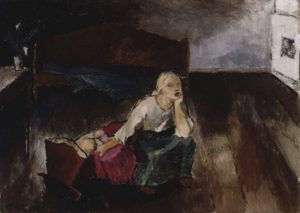 The poetics of such a democracy are reduced to the virtuality of a Rawlsian “veil of ignorance” that acts in a dehistoricized way as something like a state of nature.[27] Here is where the idea of western civilization finds itself in crisis: in the dehistoricized account of a civilization emerging from a state of nature that offers to some hangers-on the Kantian ideal of a future-oriented version of Rousseau’s state of nature. The “end of history” erupts in the inability to channel force.
The poetics of such a democracy are reduced to the virtuality of a Rawlsian “veil of ignorance” that acts in a dehistoricized way as something like a state of nature.[27] Here is where the idea of western civilization finds itself in crisis: in the dehistoricized account of a civilization emerging from a state of nature that offers to some hangers-on the Kantian ideal of a future-oriented version of Rousseau’s state of nature. The “end of history” erupts in the inability to channel force.
[1] Scotus argued against a eudaimonistic view of morality (which Aquinas held) — based on a morality determined by human happiness and the will. As Thomas Williams points out (and translates): “Therefore, that affectio iustitiae, which is the first controller of the affectio commodi with respect to the fact that the will need not actually will that to which the affectio commodi inclines it, or will it to the highest degree, is the innate liberty of the will.”
Thus the affectio iustitiae provides the freedom that the will could not have if it were merely intellective appetite. Heidegger’s work on Scotus leads to his work on Aristotle’s concepts. Renaissance humanists reacting against Scotus’ thinking labeled his students “dunces.”
Roger Green, PhD, is a Lecturer in English who teaches composition and rhetoric at Metropolitan State University in Colorado. His recent professional work brings political theology into conversation with the field of aesthetics. He is the author of “Aldous Huxley, in the Aldous Huxley Annual: A Journal of Twentieth-Century Thought and Beyond (Ed. Bernfried Nugel and Jerome Meckier (vol. 14, 2014 / 2015) and several other related articles. In 2011 he received a certificate from the Cornell School of Criticism for the work he did with political theorist Victoria Kahn. He is also a performing musician and a composer.
__________________________________________________
[1] See: Sean J. McGrath, “Heidegger and Duns Scotus on Truth and Language,” Review of Metaphysics (vol. 57.2, 2003), 339-358.
See also, Thomas Williams, “How Scotus Separates Morality from Happiness,” American Catholic Philosophical Quarterly (vol. 69, 1995), 425-445. [Preprint available online.]
[2] David Lovekin, in Technique, Discourse and Consciousness, has pointed out that the well-worn term ‘prison house’ was a rather poetic translation by Erich Heller of Nietzsche’s concept of the constraint of language. It was picked up by Frederic Jameson and widely disseminated as a meme among scholars (209).
[3] See Kahn’s account of Cassirer’s The Myth of the State and its arguments against Heidegger in The Future of Illusion.
[4] Immanuel Kant, “Idea for a Universal History with a Cosmopolitan Purpose,” Kant’s Political Writings, Ed. H. S. Reiss, Trans. H. B. Nisbet, New York: Cambridge UP, 1970, p. 42.[5] Ibid.
[6] Ibid., p. 43.
[7] Ibid., p. 44.
[8] Ibid., p. 48.
[9] Ibid., p. 49.
[10] Ibid., p. 53.
[11] Ibid.
[12] In English, “will” is not a version of the verb “to be.” It has a double meaning that collapses conscious intention and futurity. Greek has an optative case concerned with wishing toward the future, which must be distinct from the place of the subjunctive or hypothetical in English.
[13] The late Derrida will argue that Heidegger never escapes Cartesianism.
[14] And, simultaneously, it is not a defense of Heidegger or other thinkers’ politics!
[15] Victoria Kahn, The Future of Illusion: Political Theology and Early Modern Texts, Chicago: Chicago UP, p. 79.
[16] Ibid.
[17] Ibid., p. 81.
[18] Ibid., p. 80.
[19] Ibid., p. 81.
[20] Ibid., p. 84.
[21] Ibid., p. 85.
[22] Ibid., p. 84.
[23] Ibid., p. 85.
[24] Ibid., p. 95.
[25] Ibid., p. 98.
[26] See Quentin Skinner’s Liberty Before Liberalism.
[27] John Rawls, A Theory of Justice, (Cambridge: Harvard University Press, 1971). Rawls describes his “veil of ignorance” or “original state” as like the state of nature and even claims that, “[c]ontract theory agrees, then, with utilitarianism in holding that the fundamental principles of justice quite properly depend upon the natural facts about men in society. This dependence is made explicit by the description of the original position” (159).


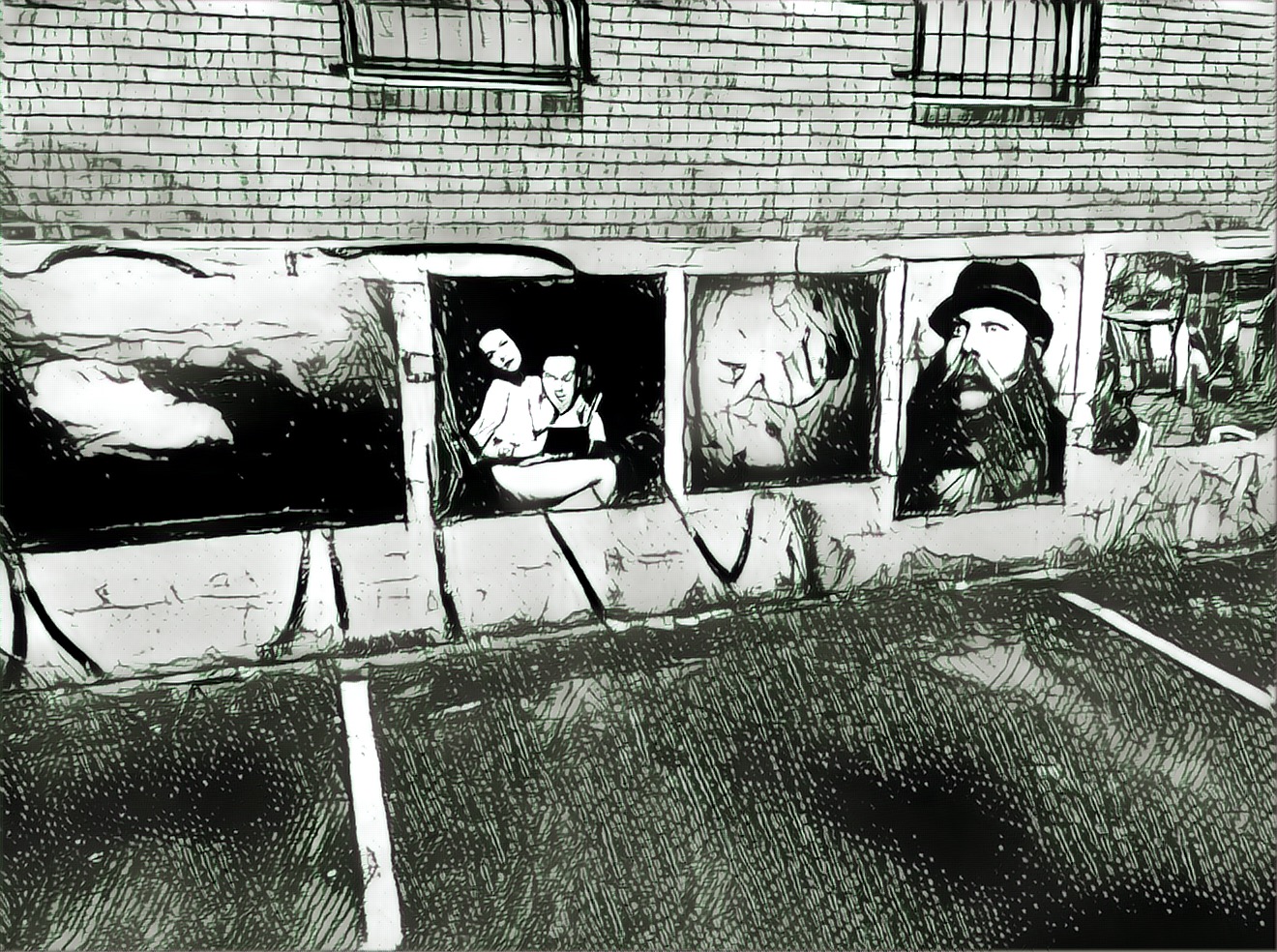

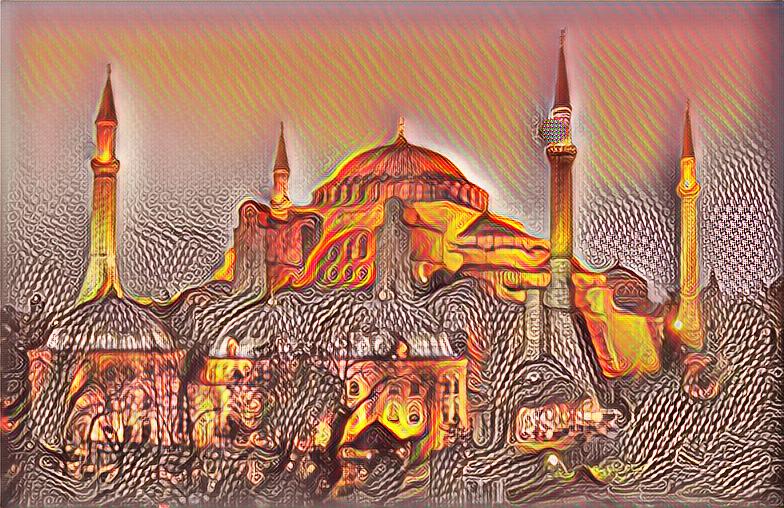
One thought on “Force in Religious Thought – Carl Raschke and Victoria Kahn in Dialogue, Part 2 (Roger Green)”